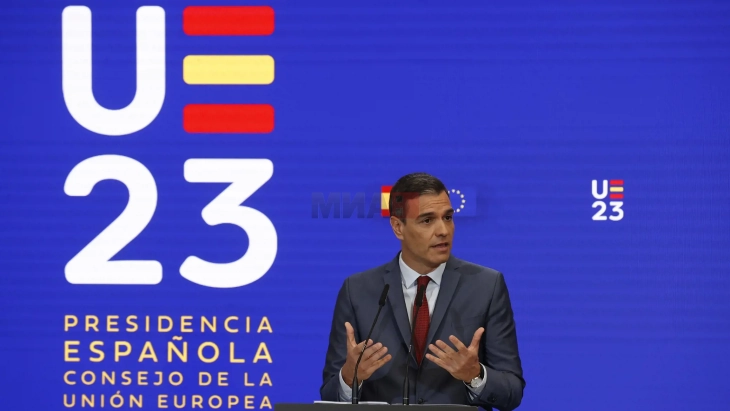Spanish PM Sánchez visits Kiev on day one of Spain's EU presidency
- Spain's Prime Minister Pedro Sánchez arrived in the Ukrainian capital Kiev for talks with President Volodymyr Zelensky on Saturday, the first day of Madrid's six-month EU presidency.
- Post By Angel Dimoski
- 12:36, 1 July, 2023

Kiev, 1 July 2023 (dpa/MIA) - Spain's Prime Minister Pedro Sánchez arrived in the Ukrainian capital Kiev for talks with President Volodymyr Zelensky on Saturday, the first day of Madrid's six-month EU presidency.
"I wanted the first act of the Spanish EU presidency to start together with [Volodymyr] Zelensky," Sánchez wrote in a post on Twitter on Saturday morning, which included pictures of his arrival at the train station in Kiev.
The goal of his trip, the Spanish leader said, was to convey to Ukraine Europe's continued solidarity with the invaded country.
"We will continue to support the Ukrainian people until peace returns to Europe," he wrote.
Spain's left-wing minority government took over the rotating European Union presidency from Sweden on July 1 and will lead the bloc for the next six months, including during the run-up to European elections next year.
Ukraine has been fending off a war of aggression by Russia for more than 16 months. In Kiev, Sánchez was to meet Zelensky, among other government representatives.
The 27 EU member states take turns holding the EU presidency every six months. The presiding country chairs numerous meetings in Brussels, Luxembourg and at home, sets its own priorities and tries to mediate controversies.
Items high on the agenda for Spain's EU presidency are pushing ahead with the introduction of corporate taxation reforms, the fight against tax evasion by large multinational corporations and the completion of the banking union. Also on the agenda are plans to reform the EU asylum system and new debt rules.
In June, Sánchez said that Europe needs "a more competitive, fairer and more solidarity-based economy."
Tax evasion costs Europe "1.5 percentage points of GDP every year" which is equivalent to the amount invested in social housing and environmental protection, he said.
Spain would use its presidency to "work to end this injustice and set minimum standards for corporate taxation in all member states, especially in the digital sector," the socialist politician said.
However, an upcoming parliamentary election in Spain on July 23 could hamper those goals. The conservative People's Party (PP) is currently polling ahead of Sánchez's Socialist Workers' Party (PSOE).
If a new government in Spain is formed, it may then want to set new priorities.
In Brussels, there are fears that a shift in power in Spain could delay ongoing EU legislative projects because the EU presidency plays an important role in mediating compromises between the EU states, but also between the EU states and the European Parliament.
Photo: EPA







